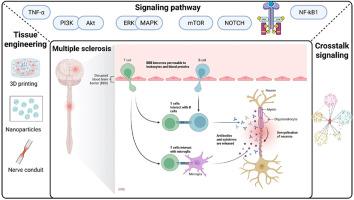Molecular mechanism and the main signaling pathways in the development and progression of multiple sclerosis
IF 3.5
3区 生物学
Q3 CELL BIOLOGY
引用次数: 0
Abstract
Multiple sclerosis (MS) is a chronic, inflammatory central nervous system (CNS) disorder that often leads to significant disability, particularly in younger individuals. Its pathogenesis is thought to involve a complex interplay between genetic predispositions and environmental factors, culminating in CNS inflammation. Despite extensive research, treatment options for MS remain limited and often only partially effective. This review examines key signaling pathways implicated in MS progression, focusing on their potential as therapeutic targets. These pathways include the Fibroblast Growth Factor (FGF)/FGF receptor signaling, MAPK, NF-kB, JAK/STAT, Notch, mTOR, TGF-β, and PI3K/Akt pathways. The FGF pathway, particularly FGF2, plays a pivotal role in myelination and remyelination, while also contributing to neuroinflammation and disease exacerbation. Dysregulated MAPK/ERK signaling in microglia is associated with neurodegeneration, and NF-kB activation in glial cells promotes inflammation and demyelination. The JAK/STAT pathway is crucial for immune response regulation, with its dysregulation being a key factor in MS pathogenesis. Notch signaling regulates oligodendrocyte precursor cell differentiation, offering potential therapeutic advantages. mTOR and TGF-β signaling are essential for oligodendrocyte survival and tissue repair. Finally, the PI3K/Akt pathway is involved in cell survival and immune modulation, with applications in tissue engineering to enhance remyelination. These pathways provide valuable insights into MS mechanisms, highlighting novel therapeutic strategies.

多发性硬化症发生发展的分子机制及主要信号通路
多发性硬化症(MS)是一种慢性炎症性中枢神经系统(CNS)疾病,通常会导致严重的残疾,特别是在年轻人中。其发病机制被认为涉及遗传易感性和环境因素之间的复杂相互作用,最终导致中枢神经系统炎症。尽管进行了广泛的研究,但多发性硬化症的治疗选择仍然有限,而且往往只是部分有效。这篇综述探讨了与MS进展有关的关键信号通路,重点是它们作为治疗靶点的潜力。这些通路包括成纤维细胞生长因子(FGF)/FGF受体信号通路、MAPK、NF-kB、JAK/STAT、Notch、mTOR、TGF-β和PI3K/Akt通路。FGF通路,特别是FGF2,在髓鞘形成和再髓鞘形成中起关键作用,同时也有助于神经炎症和疾病恶化。小胶质细胞中MAPK/ERK信号的失调与神经退行性变有关,胶质细胞中NF-kB的激活促进炎症和脱髓鞘。JAK/STAT通路在免疫应答调控中起着至关重要的作用,其失调是MS发病的关键因素。Notch信号调节少突胶质前体细胞分化,具有潜在的治疗优势。mTOR和TGF-β信号对于少突胶质细胞存活和组织修复至关重要。最后,PI3K/Akt通路参与细胞存活和免疫调节,并在组织工程中应用以增强髓鞘再生。这些途径为MS机制提供了有价值的见解,突出了新的治疗策略。
本文章由计算机程序翻译,如有差异,请以英文原文为准。
求助全文
约1分钟内获得全文
求助全文
来源期刊

Experimental cell research
医学-细胞生物学
CiteScore
7.20
自引率
0.00%
发文量
295
审稿时长
30 days
期刊介绍:
Our scope includes but is not limited to areas such as: Chromosome biology; Chromatin and epigenetics; DNA repair; Gene regulation; Nuclear import-export; RNA processing; Non-coding RNAs; Organelle biology; The cytoskeleton; Intracellular trafficking; Cell-cell and cell-matrix interactions; Cell motility and migration; Cell proliferation; Cellular differentiation; Signal transduction; Programmed cell death.
 求助内容:
求助内容: 应助结果提醒方式:
应助结果提醒方式:


